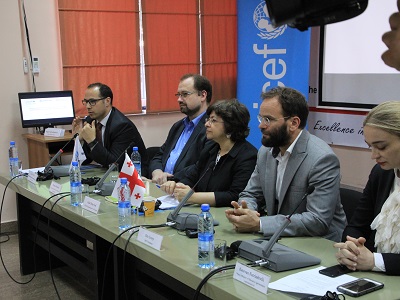ISET students present on tax administration issues
- Details

ISET continues its student policy paper seminar series for the institute's (now graduated) second-year students. This time, Tatia Sosiashvili, Megi Tsikoridze, Nino Aladashvili, and Sopo Basilidze presented their joint paper on tax administration in Georgia. Their project, entitled “Current Challenges in Tax Administration (VAT)”, was supervised by Eric Livny, President of ISET and the ISET Policy Institute, and Sophiko Skhirtladze, an ISET Resident Faculty member and head of the Private Sector Development Policy Research Center.
The students explained that tax administration is an important tool for the government to implement and enforce tax laws and receive mandates by law. It includes the management of taxpayers’ registration, including the detection of non-registration and false registration; the processing of tax returns, withholdings and third-party information; the verification or examination of the correctness and completeness of received information; the process of enforced debt collection, and the handling of administrative appeals and complaints.
Challenges and Achievements in Vocational Education and Training in Georgia: Second Education Policy Forum (EPF) Dialogue
- Details

On June 15, representatives from the World Bank, UNICEF and ISET gathered to analyze challenges and achievements in Vocational Education and Training (VET) in Georgia, as a part of the Education Policy Forum. The event was opened by Ozan Sevimli (the World Bank Program Coordinator for the South Caucasus), Ms. Laila Omar Gad (UNICEF's Representative to Georgia), Eric Livny (President of ISET) and Ketevan Natriashvili (Deputy Minister of Education).
Mr. Sevimli argued that the economic competitiveness of the country is very much dependent on the skills and competences of its workforce, which come up as one of the key bottlenecks in economic growth and poverty elimination in Georgia. Furthermore, he claimed that these problems are very much dependent on the education system in the country. In particular, vocational training is a very crucial element enhancing economic productivity in the country, and Mr. Sevimli emphasized that there has been a lot of work done in the vocational education sector in terms of admission exams, and some involvement from the private sector. However, he noted that 'Georgia is not there yet' and highlighted two main problems: firstly, the private sector is far away from the exchange that needs to happen between skills and what is needed in the labor market. Secondly, vocational education does not enjoy a particularly positive reputation in Georgia; it is perceived as being for those unable to achieve in acadmia. For her part, Ms. Natriashvili acknowledged the problems mentioned by Mr. Sevimli.










